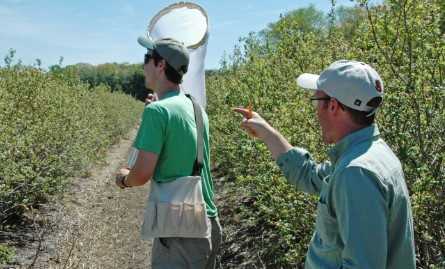By Joy Landis
Crop yields for apples, cherries and blueberries across the United States are being reduced by need for more pollinators, according to new research. The study is from the Integrated Crop Pollination Project coordinated by Michigan State University and was led by Rutgers University researchers.
Most of the world’s crops depend on bees and other insects for pollination, so the reported declines in honey bees and wild bee populations raise concerns about food security, notes the study in the journal Proceedings of the Royal Society B: Biological Sciences.
“We found that many crops are pollination-limited, meaning crop production would be higher if crop flowers received more pollination. We also found that honey bees and wild bees provided similar amounts of pollination overall,” said senior author Rachael Winfree, a professor in the Department of Ecology, Evolution, and Natural Resources at Rutgers University–New Brunswick. “Managing habitat for native bee species and/or stocking more honey bees would boost pollination levels and could increase crop production.”
Pollination by wild and managed insects is critical for most crops, including those providing essential micronutrients, and is essential for food security, the study notes. In the U.S., the production of crops that depend on pollinators generates more than $50 billion a year.
“… apples, sweet cherries, tart cherries and blueberries showed evidence of production being limited by pollination, indicating yields are currently lower than they would be with full pollination.”
Through the multi-state Integrated Crop Pollination Project, scientists collected data at 131 farms across the U.S. and in British Columbia, Canada, on insect pollination of crop flowers and yield for apples, highbush blueberries, sweet cherries, tart cherries, almond, watermelon and pumpkin. Of those crops, apples, sweet cherries, tart cherries and blueberries showed evidence of production being limited by pollination, indicating yields are currently lower than they would be with full pollination. Wild bees and honey bees provided similar amounts of pollination for most of the crops, though almond was highly dependent on honey bees.
The annual production value of wild bees for all seven crops in the U.S was estimated at $1.5 billion-plus. The value of wild bee pollination for all pollinator-dependent crops across the nation would be even greater.

Entomologist Jason Gibbs (right) collects bees with graduate research assistant Knute Gundersen in a Michigan blueberry field. A team of scientists collected data at farms across the U.S. and in British Columbia, Canada, to understand the importance of wild bees and honey bees for production of various crops.
“Our findings show that pollinator declines could translate directly into decreased yields for most of the crops studied,” the study says. The results suggest that adopting practices that conserve or augment wild bees, such as enhancing habitat to support blooming trees and shrubs and wildflowers, or using managed pollinators other than honey bees, is likely to boost yields. Increasing investment in honey bee colonies is another alternative growers can consider to reduce the risk of limited pollination.
The study included data from fruit farms across Michigan, including those growing blueberries, cherries and apples. Teams from the Department of Entomology at MSU sampled these farms over multiple years, recording insect visitors to flowers and the fruit produced in each farm.
“This study highlights the potential to increase yields on existing farms through improved pollination management,” said project director Rufus Isaacs, who led the blueberry research. “Our research and extension programs will continue to help growers make pollination decisions that result in high yields.”
The Integrated Crop Pollination Project was funded by the USDA-NIFA Specialty Crop Research Initiative. The project included students, postdocs and faculty at 15 organizations across the U.S. and Canada. To learn more about other aspects of the project: www.projecticp.org
Source : msu.edu